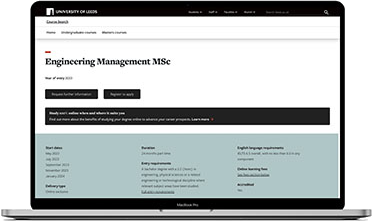Meet Dr Mohammed Abdelmegid, the Programme Lead for Engineering Management
Engineering Management
Dr Mohammed Abdelmegid is the Programme Lead for the online Engineering Management Masters course. He is an expert in the field with a keen passion for driving innovative solutions in the engineering industry that improve the delivery of projects.
In this Q&A, we speak to Mohammed about his experience to date, the research projects he’s involved in and what he wants his students to achieve from studying the online MSc.
Learn more about our Engineering Management courseQ: Firstly, please, could you begin by introducing yourself?
My name is Dr Mohammed Abdelmegid, and I’m originally from a small city in Egypt called Tanta. I’ve lived in several countries to study and work before moving to the UK in December 2022. I am a Lecturer in Engineering Management at the University of Leeds and the Programme Lead of the online Engineering Management MSc.
Q: Could you tell us a little bit more about your experience? How did you get to where you are today?
I am a Civil Engineer by profession and worked in different roles in the industry before shifting to academia.
I first started as a Structural Designer as I really enjoyed creating models of buildings and testing them virtually under different loading conditions, and I also did some Quantity Surveying jobs on the side.
I worked in a consultancy role supporting a wide range of clients, which allowed me to work on different types of projects including infrastructure, defence, manufacturing, residential, and hospitality. After four years in this position, I worked as a Construction Manager on the client side and was very lucky to be involved in a project in which I was responsible for its structural design. This gave me great insight into how my designs translated in reality, and how the coordination between on-site engineering designs ensures that engineering services are delivered to the highest standard which minimises any clashes between services.
During my three years working on-site, I did a part-time MSc in Construction Engineering and Management. By the end of this degree, I realised that I enjoy conducting research to solve real-life industry problems, which led me to the decision to move to academia and complete a PhD at the University of Auckland in New Zealand. I can confidently say that this was the best life decision I made as I found it very rewarding to be an expert in a particular topic.
I also did some teaching during my four-year PhD which I highly enjoyed and became very good at. Following this, I was offered a full-time job as a Teaching Fellow at the University of Auckland to teach engineering management topics, which evolved to leading their Engineering Project Management Masters.
Although I was very happy with my Teaching Fellow position at the University of Auckland, I wanted to move to a position with more scope to conduct research in my field, which led me to apply for the role of Lecturer in Engineering Management at the University of Leeds. Leeds is a world-class research focused institute and allows me to do research while still being involved in higher education by leading the Engineering Management MSc and supervising students in this programme.
Q: And why engineering? Where does your passion for this subject stem from?
The concept of creating smart machines to support human activities has been my passion since my childhood. I’ve always enjoyed watching documentaries on manufacturing plants (such as How It’s Made) and going on trips to nearby factories.
I used to be amazed at how production operations are becoming more intelligent and efficient, and this passion has always been the driving force for me to study and work in engineering.
Q: What would you say is your main area of expertise in engineering? And do you have any particular research interests?
I am passionate about finding innovative solutions in the engineering industry which improve the delivery of projects.
In my PhD and MSc research, I investigated the interface between several operational research and project management applications to develop decision-making support tools that capture the complexity of construction systems, examine different scenarios, and provide insights to construction managers.
Engineering is about generating positive change in society; innovation in the field is not an end in itself. As such, there should be a balance between optimism and realism when working on projects. I always put practicality as the main driver for my research efforts, which are in the fields of operational research, productivity improvement, lean production, construction digitalisation, risk management, and knowledge management.
Uncover some of the top research projects at the Faculty of Engineering and Physical Sciences
Q: Could you tell us a bit more about the Engineering Management programme? What does it involve and who’s it for?
The Engineering Management MSc incorporates management science into engineering applications. Its learning materials cover a broad range of managerial concepts in a bespoke way for engineers to understand and interact with these concepts in their daily tasks.
zxThe course is designed to serve engineers at different stages in their careers, especially those that want to shift to managerial positions and obtain technical skills and experiences that make their work more successful.
Q: The course is taught fully online – what’s that like and how much interaction do you have with the students?
My interaction with students comes in different forms including online webinars that allows students to meet their peers and instructors and initiate dialogs about topics covered in the course.
Alongside this, there are also online boards where students can participate in discussions and share ideas in a textual form with their peers and instructors. They can also interact with their assigned academic tuto9r directly to ask any questions, even if they are not related to the learning materials.
Find out more about the benefits of online learning with Leeds
Q: What can students expect to learn?
Students will learn the principles and practices of engineering management including business management, innovation and entrepreneurship, leadership and organisational behaviour, technology management, project management, safety science, decision making, and supply chains.
All these topics are designed to help students perform their managerial responsibilities in a scientific manner that is informed by theory, best practices, and ethical values.
Q: What are you hoping for students to get out of the course?
I want students to develop into world-class engineering leaders that act with integrity and accountability, whilst positively contributing to their societies and generating value to their organisations.
Q: Why did you choose to join the University of Leeds?
The University of Leeds is a dynamic institution that values its staff as much as students. In addition, the Engineering Schools are all highly regarded and consistently ranked amongst the top schools in the UK.
The opportunity to lead the Engineering Management MSc was a perfect fit for my professional career plans and the research facilities at the University enable me to advance my research directions and make a positive contribution to the body of engineering knowledge and to society.
Q: What is it like being a part of the Faculty of Engineering and Physical Sciences?
The Faculty of Engineering and Physical Sciences is a massive unit within the University that delivers a wide range of sophisticated degrees by experts in their fields. I particularly like the collaborative environment within the faculty and the level of support provided to academic staff that helps successfully deliver research-led teaching and value-adding research.
Q: And you work closely with four different schools as part of the Engineering Management Masters. What’s it like collaborating with them?
I highly enjoy collaborating with people from different backgrounds, and it creates an environment that promotes knowledge sharing and innovative problem-solving.
I meet the programme’s teaching team from the wider faculty (as well as from Leeds Business School) regularly to discuss any challenges and brainstorm solutions. Also, I am part of the Teaching and Learning in Engineering Network (TALENT), which connects regularly to share best practices and collaborate on engineering education initiatives.
Q: Could you tell us about how the research projects underway at the University of Leeds benefit the course?
I consider the research projects to be the most rewarding part for students on the Engineering Management MSc. It enables students to consolidate their learning from the course’s modules by working independently on a project of their choice, which provides them with practical experience, project management skills, research skills, networking opportunities, and personal development. It can also be considered a taster for students who aspire to pursue further studies at PhD level.
Q: If you could give one piece of advice to someone considering studying Engineering Management with the University of Leeds, what would it be?
When I reflect on my own experience of working in the industry while completing a part-time Masters degree, I think the main advice is to always take any opportunity to grow as an engineer.
Current societal and economic challenges require engineers that have a good awareness of how to lead teams and deliver successful projects and operations. At a certain point in an engineer’s career journey, they will probably realise that technical engineering capabilities are not enough, and that they need to be competent and confident managers to stand out and make sense of what they do.

Did you enjoy this blog? Here’s some related engineering content that you may be interested in:

Want to learn more about our online Engineering Management course?
Check out the course content and how to apply.

